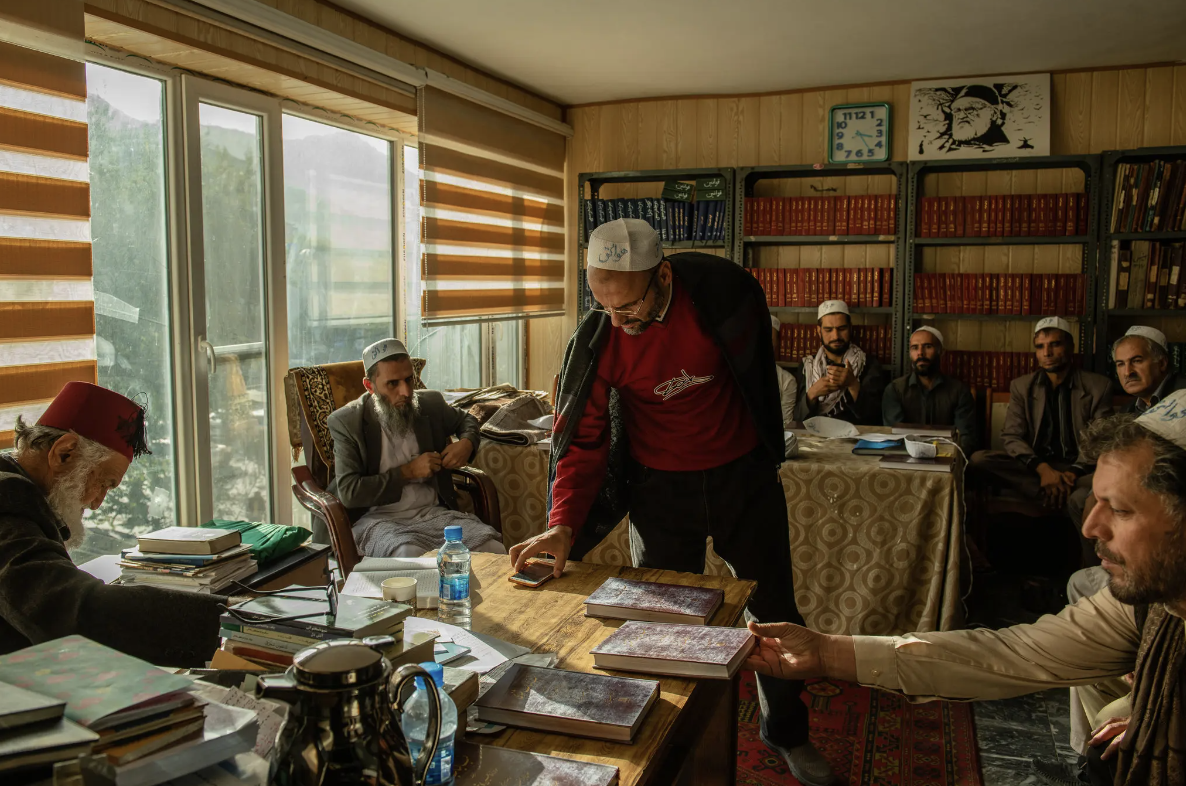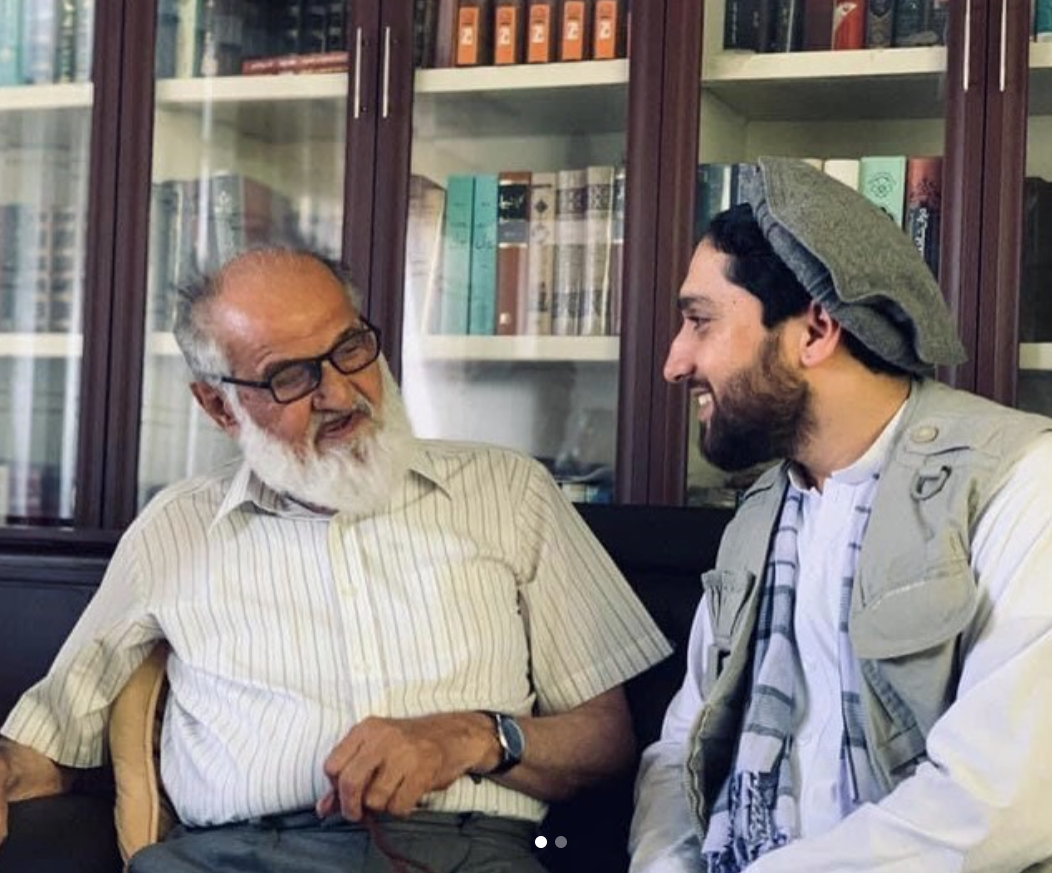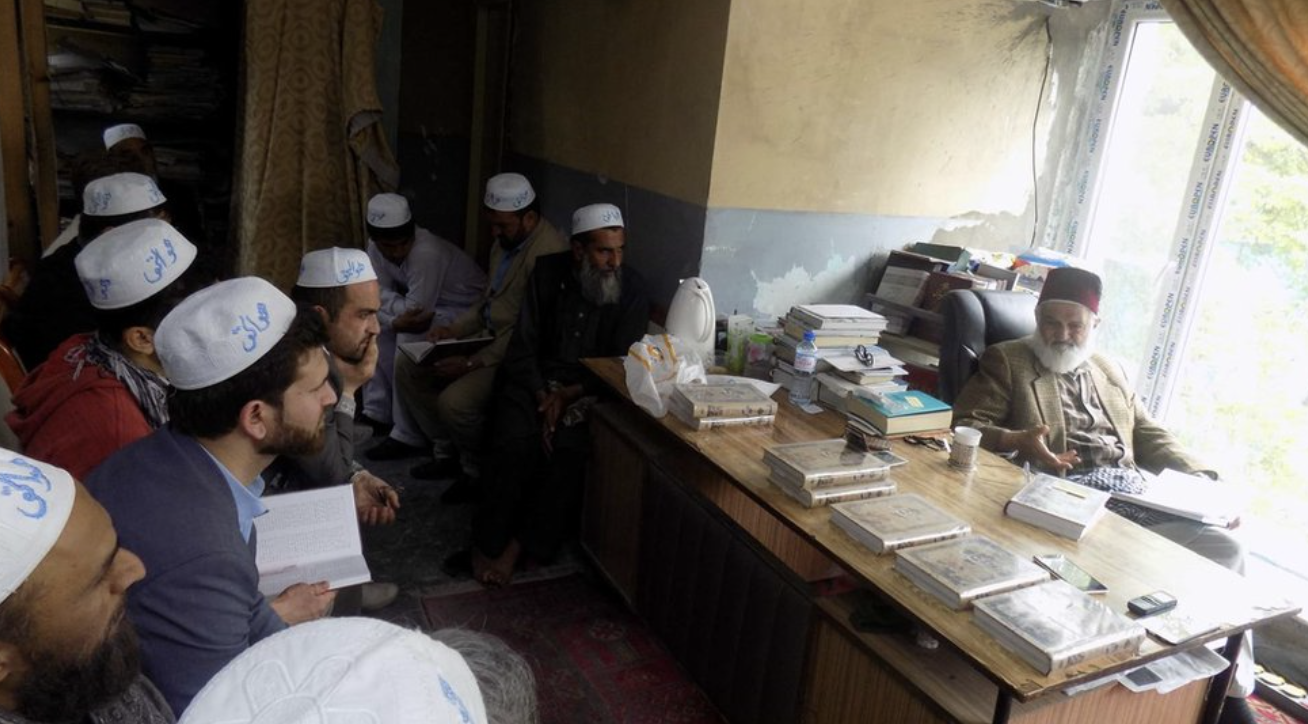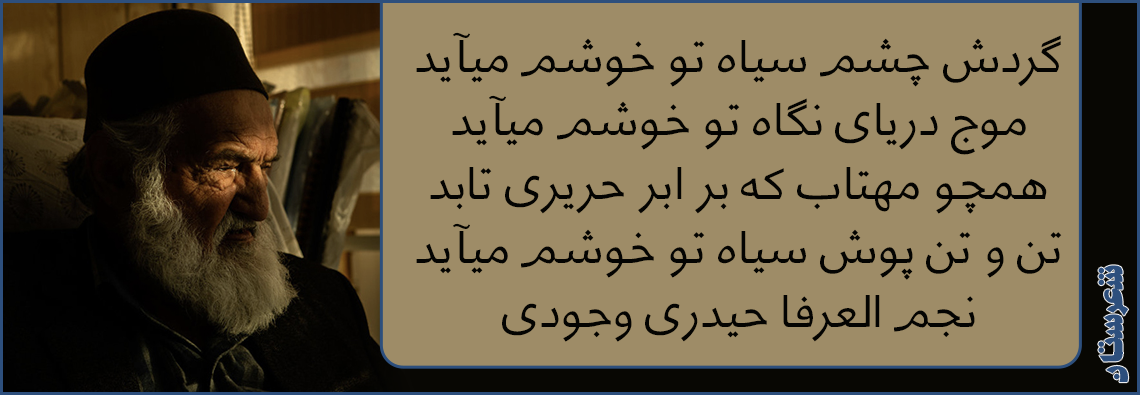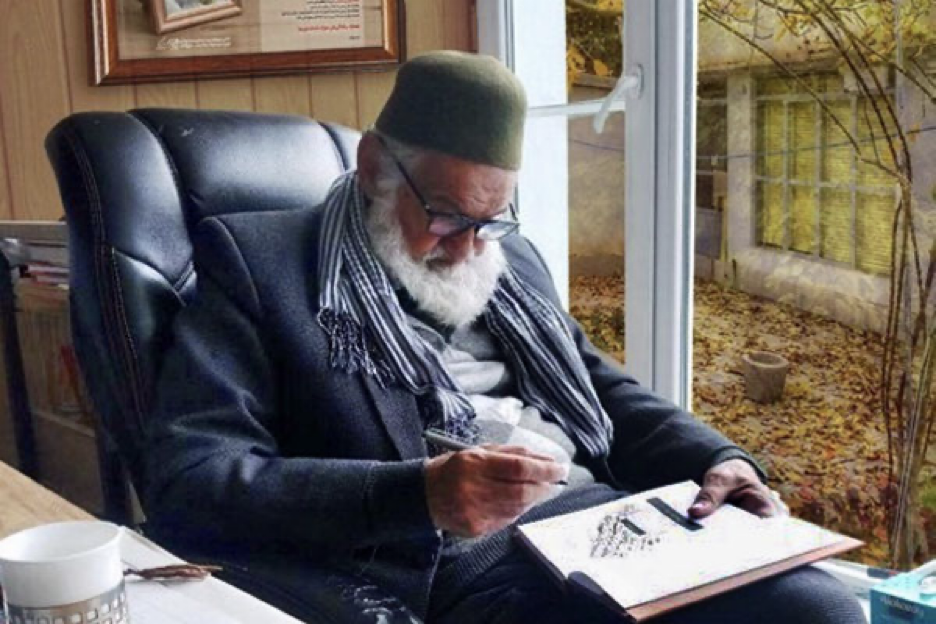The Lasting Legacy of Haidari Wujodi: Poet, Librarian, and Sufi Mystic
By Maher Saadat | Monday, June 10, 2024 | maher@wearenrf.org
بشر ای دشمن آرامی خویش
هوسها پختهای از خامی خویش
ز خودخواهی به دانشگاه هستی
شدی انگیزه ناکامی خویش
O human, enemy of your own peace,
You have matured your desires from your own immaturity.
From selfishness, in the university of existence,
You have become the cause of your own failure.
- Ustad Haidari Wujodi
For over fifty years, Haidari Wujodi's desk at the Kabul Public Library stood as a symbol of wisdom amid the turmoil in Afghanistan. Even as the country endured decades of conflict and upheaval, his presence provided a sanctuary for poets, musicians, students, and anyone seeking solace and enlightenment. He was deeply loved and respected by the people, though largely overlooked by the government, leading a quiet and ordinary life. After his death during the COVID-19 pandemic, his followers and Kabul University students called for the university library to be named in his honor, but their requests were met with silence from the officials.
Although years before his passing, he was once offered a higher position by the government, Wujodi declined, preferring to remain at his beloved library where he could continue his work in a familiar and meaningful setting. His decision to stay close to the community and maintain his daily routine at the Kabul Public Library spoke volumes about his commitment to his principles and his desire to serve as a mentor and guide.
Wujodi’s formal education extended only to the sixth grade. At fifteen, he moved to Kabul, where he was mentored by the esteemed Sufi poet, Sufi Ashqari. This mentorship played a crucial role in developing his poetic skills and deepening his spiritual insight. Ashqari’s bookbinding shop in old Kabul became a gathering place for poets and intellectuals, where Wujodi immersed himself in the rich traditions of Persian poetry. This mentorship involved a profound exchange of spiritual and poetic ideas. When Ashqari passed away, he entrusted his unfinished works to Wujodi, who diligently completed them, ensuring his mentor’s legacy lived on.
Haidari Wujodi's career at the Kabul Public Library spanned over five decades. His daily routine was marked by quiet dedication, extending beyond the management of books and periodicals. Initially in charge of the periodicals section, Wujodi carefully curated and maintained a wealth of literary resources. His commitment was so strong that even after retiring, he continued to visit the library. Over the years, his desk became a center for musicians, poets, students, and even street vendors seeking his wisdom. Wujodi welcomed everyone with equal warmth, embodying the Sufi principles of humility and generosity. His influence went beyond his official duties, as he became a beloved mentor and guide to countless individuals who visited the library.
For three decades, Haidari Wujodi hosted bi-weekly reading sessions of Rumi's works, creating a unique spiritual and intellectual gathering in Kabul. These sessions, held every Monday and Wednesday, were more than literary discussions—they were profound explorations of Sufi mysticism, spirituality, and philosophy. Participants, part of "The Society of Lovers of Mawlana," included a diverse group of men and women, all drawn by the magnetic pull of Rumi’s poetry and Wujodi’s insightful interpretations. In these sessions, Wujodi would delve into the intricate themes of Rumi's poetry, often focusing on the deeper spiritual meanings behind the verses. He described Rumi's work as "a factory of human making," emphasizing the transformative power of introspection and inner purity. The gatherings began with a serene atmosphere, as sunlight filled the room and a peaceful silence enveloped the attendees. A member would often sing verses in a melodic voice, followed by Wujodi’s gentle yet profound explanations. His teachings stressed the importance of cleansing the heart, likening it to a mirror that, when free of dust and fog, reflects the divine. These sessions not only nurtured a community of spiritual seekers but also reinforced the timeless relevance of Sufi wisdom in contemporary life.
گردش چشم سیاه تو خوشم میآید
موج دریای نگاه تو خوشم میآید
همچو مهتاب که بر ابر حریری تابد
تن و تن پوش سیاه تو خوشم میآید
I am enchanted by the movement of your dark eyes,
The waves of the sea in your gaze delight me.
Like moonlight shining on a silken cloud,
Your body and the black garment you wear captivate me.
Haidari Wujodi's poetry is celebrated for its deep exploration of love, spirituality, and humanism, making him a significant figure in Persian literature. His works are known for their accessibility and profound insight, addressing universal themes that resonate with many. Wujodi’s poetic style is clear and elegant, making his spiritual and philosophical ideas approachable for readers from all walks of life. His verses often explore the relationship between the human soul and the divine, highlighting the transformative power of spiritual love. A recurring theme in his work is the quest for inner peace and enlightenment, reflecting his strong connection to Sufi mysticism. His poems frequently use imagery of nature, like gardens and flowers, to symbolize the beauty and purity of the spiritual journey.
One of his notable poems captures the essence of his philosophy:
ای محرمان جان دل، از خـــــویش بیرون گشتهام
بیرون زقــید آب و گل، آنسـوی گـردون گشتــهام
آیینهها بشکستهام، با اصـــل خود پیــــوستــهام
از دام و صــورت رستهام، از لفظ افــزون گشتـهام
O confidants of the heart, I have transcended myself,
Beyond the confines of water and clay, I have reached beyond the heavens.
I have shattered the mirrors and united with my essence,
Freed from the snare of form, I have surpassed mere words.
This poem captures Wujodi's belief in the importance of spiritual cleansing and self-reflection, comparing the heart to a mirror that needs to be polished to reflect divine truth. His poetry enriches the literary landscape and serves as a guide for those seeking deeper spiritual understanding. Wujodi's influence goes beyond his written works; his poetry readings and public lectures have made a lasting impression on many. His ability to convey complex spiritual concepts in a relatable way has earned him widespread admiration and respect. Through his poetry, Haidari Wujodi continues to inspire and guide countless individuals on their spiritual journeys.
Haidari Wujodi’s influence on contemporary poetry and culture in Afghanistan is profound and enduring. His dedication to preserving and promoting Sufi traditions has played a significant role in keeping these spiritual practices alive in modern times. Wujodi’s work not only enriched the literary world but also provided a bridge between Afghanistan’s rich cultural heritage and the challenges of the contemporary world.
Since his passing, and under the shadow of Taliban rule, Afghanistan has changed dramatically. The intellectual and cultural freedoms that Wujodi cherished and nurtured are under severe threat. His legacy, however, remains a testament to the enduring power of poetry and spirituality in the face of oppression. Wujodi's life and work continue to inspire, reminding us of a time when Kabul was a vibrant center of art and learning, and offering hope for a future where such values might once again flourish.
ای کاش که در روی جهان جنگ نمیبود
در کارگه شیشهگـــران سنگ نمیبود
دنیا همه راحتـــکده میگشت بشـــر را
گر فتنه و خودخواهی و نیرنگ نمیبود
بر مـــردمِ آواره زمیــــــن تنگ نمیشد
گر دیـــدۀ خــود بینِ فلک تنگ نمیبود
روشنگـــرِ دلهای پُـــر امید نمیگشت
گر نالــۀ شامم سحـــر آهنـگ نمیبود
گر کــوه غمِ عشـــق به دوشــم نفتادی
هنــــگامِ جــوانی کمـــرم چنگ نمیبود
امــروز به سرمنــزلِ مقصود زدی گام
دیـــروز اگــــــر اشترِ ما لنگ نمیبود
I wish there were no wars in the world,
And no stones in the glassmakers' workshop.
The world would become a place of comfort for humanity,
If there were no strife, selfishness, and deceit.
The earth wouldn't feel narrow to the displaced people,
If the self-centered eye of the heavens wasn't so narrow.
Hearts full of hope would not be illuminated,
If my evening's lament did not turn into a morning song.
If the mountain of love's sorrow had not fallen on my shoulders,
In my youth, my back would not have bent.
Today you would have reached your desired destination,
If our camel hadn't limped yesterday.

